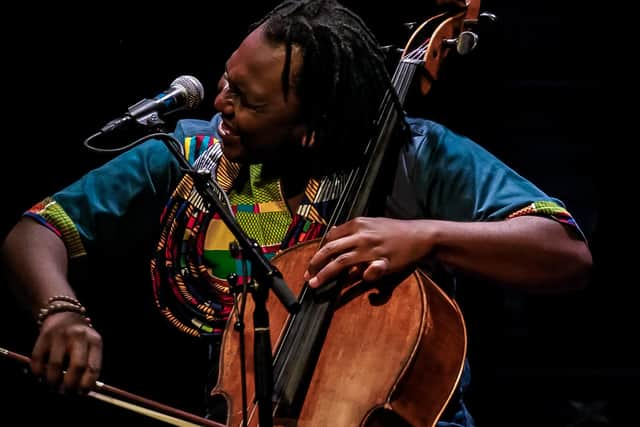Music review: BBC SSO & Abel Selaocoe, City Halls, Glasgow
When such a unique force of nature as South African cellist Abel Selaocoe explodes onto the stage, you know the show is well and truly stolen. Dressed in traditional silken garb, his wild hair tethered in a flamboyant pony tail, greeting his expectant audience with easeful familiarity, it became instantly clear that Selaocoe’s beaming presence was, in itself, enough to transform a hitherto genteel BBC SSO audience into an intoxicated horde.
For this was a visceral piece of performance art – the world premiere of Selaocoe’s own concerto Four Spirits – featuring Selaocoe himself as the key protagonist. The cello was just part of the armoury: as much focus was placed on his evocative singing, his hyperactive physicality and the theatrical partnership he engaged in with guest percussionist Bernhard Schimpelsberger. Selaocoe was frequently up on his feet gesticulating to the players, even to the audience whom he charmed into vocalised action for a participative, ritualistic finale.


Advertisement
Hide AdAdvertisement
Hide AdAmid all this animated razzmatazz was an enthralling, continuous four-movement work, fusing African and Western influences, opening with an ecstatic spiritualism, embracing variously the innocence of childhood and the intensity of societal faith expressed through free range musical vocabulary. Selaocoe’s extraordinary vocal versatility ranged from exhilarating incantations to guttural growls that shook the rafters, often accompanied simultaneously by his own mystical counterpoints on cello or in intimate dialogue with Schimpelsberger.
As for the SSO, they also had instructions to sing as well as play, wholeheartedly obliging under the young Finnish conductor Taavi Oramo, a hip-swinging replacement for the indisposed Estonian, Anu Tali.
Oramo had already exhibited eager proficiency in Arvo Pärt’s Fratres – it’s ethereal allure, though, taking time to settle – and he closed the programme with Sibelius’ Symphony No 2, its intelligence and cohesion compensating for minor shortfalls in manicured detail and balance.